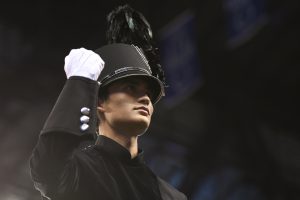Marching Greyhounds take home Bands of America Grand National Championship
Writer / Jon Shoulders
Photographer / Sue Eckl Photography
 The hard work and dedication that each of the 311 student members of the Carmel High School (CHS) marching band put into their 2017 season has paid off – not only in the form of a national championship, but in what band director Chris Kreke says are valuable lessons of teamwork and devotion toward a common goal.
The hard work and dedication that each of the 311 student members of the Carmel High School (CHS) marching band put into their 2017 season has paid off – not only in the form of a national championship, but in what band director Chris Kreke says are valuable lessons of teamwork and devotion toward a common goal.
“What I enjoy most is absolutely seeing what the kids get out of it,” says Kreke, who has worked at Carmel High School for 23 years and served as band director since 2012. “Watching their growth and development year after year is really, really special. It’s amazing to watch them develop as people.”
Kreke says rehearsal time for the Marching Greyhounds averages about 20 hours a week, including Saturdays, beginning in June and resuming through the fall season. Such diligence resulted in first-place honors at the Bands of America Grand National Championships on November 11 – the fourth national title for the Greyhounds and the third for Kreke as band director.
Carmel also won awards for Outstanding Music Performance, Outstanding Visual Performance and Outstanding General Effect at the Grand Nationals. One hundred teams from around the country, including seven from Indiana, competed in the three-day event.
“It’s a tight-knit group, and it has to be with the way we have to work together,” says Kreke, who also serves as chair of the CHS Performing Arts department. “It’s a pretty unique activity, where there’s not a bench or anybody who doesn’t participate. Everybody’s really dependent on everybody else, and then we spend a lot of time together too, which fosters those relationships between the kids. If you talk to any of them, they’d refer to it as a family atmosphere most of the time.”
In October, the group took first place at both the Bands of America Indianapolis Super Regional Championship and Southern California Regional Championship. During their downtime on the west coast, the group had the opportunity to hit the beach as well as Universal Studios and Disneyland.
Each December, Kreke and a team of designers begin creating the approximately nine-minute shows that the marching band performs through the fall. In June, the CHS band students begin learning and rehearsing their parts for fall performances, and the competitive season runs from mid-September through mid-November.
“The team of designers creates all-original choreography and original compositions or arrangements of existing pieces for the students,” Kreke says. “We start talking to the kids in May about what that’s going to be, and we start distributing some of the music and drum parts and things like that. Then it’s a lengthy process of creating these nine-minute original productions.”
Kreke says the heavy responsibility on each and every Marching Greyhound to flourish in their particular role during performances fosters a sense of solidarity among the group.
“There’s a lot of simultaneous responsibility where they’re having to remember where they’re going on a football field, how they’re getting there, what choreography is taking them there and playing music along with that – and then creating an emotional, passionate performance along with it,” Kreke says. “So, there’s a lot of physical and mental responsibility on them for that nine minutes.”
Kreke is quick to add that parental support, both morally and logistically, is crucial to each Marching Greyhounds season, from the beginning rehearsals in June through the season’s final competitions in the fall.
“The logistics of just moving everything to a show is pretty incredible sometimes,” he says. “For us to go to a show, it takes about 60 parents’ efforts along with all of the teaching staff. We’re on nine school buses, and we’ve got a semi trailer and four 26-foot box trucks just to transport all the equipment. We have an incredibly involved parent group who does an amazing amount of volunteer hours for us. We absolutely couldn’t do it without them.”
CHS’s lengthy tradition of marching band success was one of the driving forces behind the passion and work ethic of this year’s group, regardless of competition expectations, according to Kreke.
“They’re well aware of what students before them have done,” he says. “We rarely talk to the kids about winning trophies and the competition part of it. It’s all about trying to develop a show that’s going to be special for an audience, reaching out and making that connection to the audience. That’s how we define success with the kids. They’re just as pleased with a great performance as they are with a great performance that wins something.”`







